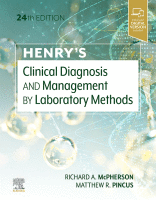Physical Address
304 North Cardinal St.
Dorchester Center, MA 02124

Key Points The minimum inhibitory concentration (MIC) is defined as the lowest concentration of antibiotic that inhibits the visible growth of an organism in vitro. It is distinguished from the breakpoint, which is the concentration of antibiotic that determines whether an…

Key Points Bacteria can be categorized based on the Gram stain reaction (gram-positive or gram-negative), shape (cocci, bacilli, coccobacilli, spirochete), preferred atmosphere (aerobic, microaerophilic, anaerobic), and presence or absence of spores. They can be identified on the basis of key…

Key Points The prevalence of allergic disease, particularly food allergy, has increased in recent years throughout the world, especially in developed countries. Allergen-specific immunoglobulin E (IgE) antibody is the most important trigger molecule for allergic inflammation. Laboratory tests for IgE…

Key Points Autoimmune disorders frequently affect the skin, gastrointestinal, and hepatobiliary systems; the kidney; the endocrine system; and the nervous system. The dominant clinical feature of organ-specific autoimmune disease is chronic inflammation, generally localized in a single organ specific for…

Key Points Vasculitis affects blood vessels of any type in any organ or tissue and causes diverse signs and symptoms of disease that overlap with many other diseases. Even if it is not the final diagnosis, vasculitis is often in…

Key Points Many types of autoantibodies to intracellular antigens are present in the various systemic autoimmune rheumatic diseases. Currently it is considered important not only to detect the presence and quantity of the intracellular autoantibody in the patient but also…

Key Points Primary immunodeficiencies are a group of disorders where the defect lies within the immune system; most of them are caused by single-gene defects. Because of the complexity of diagnosing a primary immunodeficiency, the cooperation of the clinician, the…

Key Points The major histocompatibility complex (MHC) genomic region contains many genes with immune-related functions, including the human leukocyte antigen (HLA) genes. Identification of genes within the MHC has increased the possibility of defining the genetic basis of immunity. The…

Key Points The major histocompatibility complex (MHC) is one of the most diverse and polymorphic genetic systems in humans. It consists of human leukocyte antigen (HLA) class I molecules (HLA-A, -B, and -C) and class II molecules (which include HLA-DRB1,…

Key Points Cytokines are soluble proteins released by cells to facilitate communication and interaction between cells, to modulate the immune response, to direct cell differentiation, and to orchestrate associated inflammatory and reparative activities. Adhesion molecules are complex cell surface glycoproteins…